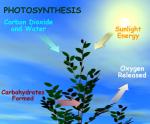|
This section contains 1,730 words (approx. 6 pages at 300 words per page) |

|
The ultimate source of energy for life on Earth is the sun. Plants are able to transform the light energy from the sun into chemical energy through a process called photosynthesis. Through absorption of light energy, plants, algae, and a few types of bacteria transform carbon dioxide and water into carbohydrates. Carbohydrates serve as fuel for their growth and metabolism. Other organisms benefit indirectly from photosynthesis.Oxygen is a waste product of photosynthesis. By releasing oxygen into the environment, plants make the air breathable for many other life forms.
The presence of oxygen in relation to plants was first demonstrated by the English chemist, Joseph Priestley in 1772. He noted that air that had been depleted through burning candles could be made breathable again by plants. Seven years later, a Dutch doctor, Jan Ingen- Housz, showed that plants required sunlight in order to make air breathable. Ingen-Housz also demonstrated...
|
This section contains 1,730 words (approx. 6 pages at 300 words per page) |

|


